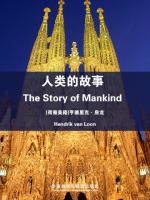the story of mankind
Alice11111
Book Review on The Story of Mankind About the author Hendrik Willem Van
Loon (1882—1944), is a Dunch American who was a successful scholar,
writer and historical geographer with a lot of great achievements. He
got his scholarship in Cornell University, his graduate degree in
Harvard and Phd in University of Munich. The Story of Mankind is Van
Loon’s representative work, which made him get the Newberry Medal in
1922. Van Loon used to do all kinds of works including teacher,
journalist, editor and even announcer, which gave him rich writing
materials and various perspectives. About the book The story of human
history is divided into three stages. On stage one, the early stage of
the development of human civilization, in which the book mainly
introduces the Sumehr, the ancient Indo-Europeans and the Greeks several
important peoples. On stage two, religion became the center of human
history. On stage three, the theme of change has replaced religion as
the main thread of human stories since modern times. Throughout these
three stages is the enterprising spirit of mankind since ancient times.
First, the individual civilizations of the early human civilization
represent the characteristics of the early development of mankind. The
first introduced nation was the Sumehr, who created the earliest known
civilization and wrote the first text which we call the cuneiform. This
is their greatest contribution to humanity. The second people were the
ancient Indo-Europeans who lived on the plains of Eastern Europe,
representing the early human migration. One of the ancient
Indo-Europeans migrated westward, through what is now the Middle East,
to the south, and eventually fell to India, becoming the ancestor of the
Indians. The other remained in Europe, either migrating westwards, or
developing southwards into the ancestors of modern Europeans. Finally,
Van Loop introduced the ancient Greek family, carefully depicting the
family's daily simple life and the pursuit of spiritual development,
with a specific family to show the spirit of the whole Greek. Second,
the development of human civilization to the important stage of
religion-themed, mainly related to the development and opposition of
Christianity and Islam. Christianity originated in Rome, developed and
prospered in the European land By the Middle Ages it had formed a
unified religious situation in Europe. Islam originated in the Arabian
Peninsula and then expanded into North Africa and Central Asia. As the
influence of Christianity and Islam grew, believers of different faiths
finally met in Jerusalem and nearby areas. Since the 11th century, under
the leadership of the Church, the Crusades, founded by Christians, have
been on the east march for two hundred years, with the main task of
competing with Islam for land and believers. However, the teachings of
Islam have increased the combat effectiveness of the Muslim army through
rules that have helped to inspire soldiers, making Muslim soldiers a
fearsome force, defeating Christians in places such as Spain. The era
of change, which came to a head, mainly introduced the Renaissance, the
Reformation, the Enlightenment and the French Revolution. The
Renaissance was one of the symbols of the end of the Middle Ages,
focusing on Dante's work from love to the human emotion. This kind of
attention to people is called humanism by later generations. Humanists
encouraged people to pay attention to their own needs and attacked the
church's hypocritical preaching and disguised corruption, which paved
the way for subsequent reforms. On the basis of humanism, Martin Luther,
the leader of the Reformation, criticized the content of religion,
suggested that faith was the only measure of believers, and many of his
recommendations were put into practice, updating the teachings and
rituals of religion, and further liberating people from the rule of the
Church. By the time of the Enlightenment, the rationality in human
thought was further excavated, and the philosophers represented by
Voltaire turned their attention to the secular imperial power and fought
for more power for the people. This spiritual inspiration helped fuel
the French Revolution. Since then, economic, technological and social
changes have been accelerating, the era of machines is coming, various
social organizations are beginning to appear, and people's enthusiasm
for science has reached unprecedented levels. The story of mankind is
constantly writing forward, step by step, close to where we are today.
Unlike other historical books, Van Loon brought thousands of years of
human history into our eyes with vivid and fluent language. His
statement doesn’t have a certain structure. On the contrary, Van Loon
used the easiest language to write about basic knowledge and the most
fascinating things. Looking back at the whole human story, the spirit of
this transformation is not only reflected in the French Revolution, but
has been flowing in the blood of mankind since ancient times. When the
Indo-Europeans abandon their familiar homes and take the first step of a
long migration, when Dante turns pure love into a line of verses, when
Martin Luther cheers his arms and attacks the corruption of the Church,
the spirit of human progress and continuous progress runs through, and
this spirit will lead mankind toward a better future.



 京公网安备 11010802032529号
京公网安备 11010802032529号